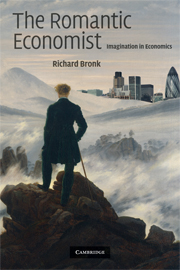1 - Preface to The Romantic Economist
Published online by Cambridge University Press: 05 March 2015
Summary
THE ROMANTIC AND IMAGINATIVE ASPECTS OF ECONOMICS
Romanticism and economics may seem strange intellectual bedfellows. Romanticism is a loose collection of philosophical beliefs and artistic creeds which celebrate the role of imagination, creativity and emotion, while being generally sceptical of the ability of scientific reason to provide a coherent set of universally applicable answers to human problems. Economics is a self-styled ‘social science’, proud of its mathematical modelling and dedicated to the analysis and prediction of the market behaviour of rational agents seeking to optimise their wealth or utility. To many, Romanticism and economics seem to be quintessential polar opposites, perfect embodiments of C. P. Snow's ‘two cultures’, separated by a ‘gulf of mutual incomprehension’. On this view, the Romantic Economist is at best an oxymoron — an apparent contradiction in terms; at worst he or she must be suffering from intellectual schizophrenia.
By contrast, I outline in this book a new approach to economics in which the Romantic Economist plays an important role both within the economics profession and in the interpretation of economic analysis for policy-makers and entrepreneurs, by providing a vital third way between extreme forms of Romanticism and neoclassical economics. For, on reflection, it is surely odd that the Romantic emphasis on imagination, creative vision and sentiment should be seen as alien to the capitalist activity and market behaviour that economists seek to explain.
- Type
- Chapter
- Information
- The Romantic EconomistImagination in Economics, pp. 1 - 28Publisher: Cambridge University PressPrint publication year: 2009



